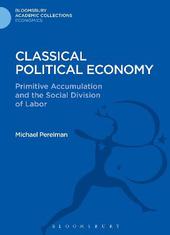
|
Classical Political Economy: Primitive Accumulation and the Social Division of Labor
Hardback
Main Details
Description
Classical Political Economy addresses the question of what determines the social division of labour, the division of society into independent firms and industries and develops the theoretical implications of primitive accumulation. It also offers a significantly different interpretation of classical political economy, demonstrating that this school of thought supported the process of primitive accumulation. Classical political economy presents an imposing facade. For more than two centuries, the accepted doctrine dictates that a market generates forces that provide the most efficient method for organising production. This laissez faire approach is an ideology that gives capital absolute freedom of action, and yet called for intervention to coerce people to do things that they would not otherwise do. Classical political economy therefore encouraged policies that would hinder people's ability to produce for their own needs. Michael Perelman, however, in this innovative take on the subject, seeks to challenge the ideologies that would allow things to continue in this line unchecked.
Author Biography
Michael Perelman is Professor of Economics at California State University, Chico, USA.
|